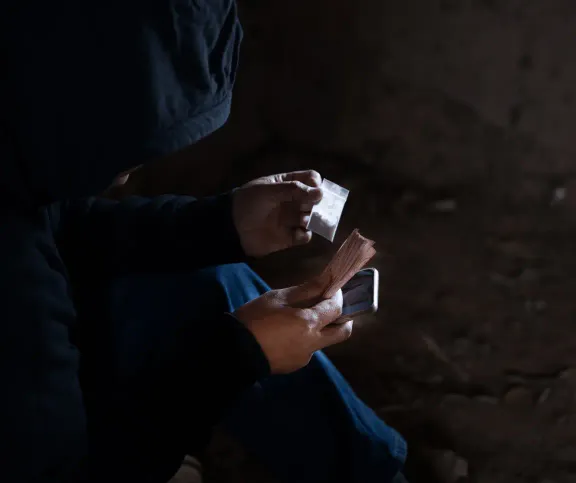Understanding Sentencing Guidelines for Being Concerned in the Supply of Drugs in the UK

You’ve been arrested. You didn’t have any drugs on you. You weren’t handing anything over. But the police say you’re concerned in the supply of drugs. Suddenly, you're facing serious charges with life-changing consequences. You’re not even sure what you’ve done wrong. And you need help getting your head around sentencing guidelines for being concerned in the supply of drugs in the UK
In the UK, being concerned in the supply of drugs is a criminal offence under the Misuse of Drugs Act 1971. You don’t need to be caught physically dealing to face prosecution. You could be charged If the authorities believe you played any role in a supply operation such as:
- answering phones
- passing messages
- handling money
This blog will explain what this offence really means, how the courts approach sentencing, and what penalties you could face. We’ll explore the concerned in the supply of drugs sentencing guidelines, what influences the outcome, and why early legal advice is so important if you're under investigation.
What Does "Being Concerned in the Supply of Drugs" Mean?
In the UK, the offence of being concerned in the supply of drugs falls under the Misuse of Drugs Act 1971. It’s a serious criminal charge often prosecuted in the Crown Court, particularly when linked to the supply of Class A or supply of Class B drugs.
This offence doesn’t require you to be physically handing over drugs. Instead, it covers a wider range of activities that show someone has taken part in a supply chain. The law targets those who play a supporting role, even if they never touch the drugs themselves.
To be charged, the prosecution must show:
- You knew drugs were being supplied
- You participated in the process — before, during, or after the supply
- Your actions helped facilitate the supply in some way
This could mean handling money, arranging transport, or simply making calls that help coordinate deals.

Examples of Involvement
Here are some real-world scenarios that could lead to a charge of being concerned in the supply of drugs:
1. Phone Line Handler
You answer calls or send messages for someone selling drugs. You don’t deliver anything, but your phone is linked to drug sales. You could still be charged.
2. Flat or Premises Holder
You allow your home to be used for drug storage, packaging or meetings. Even if you don’t supply the drugs yourself, you’re considered part of the operation.
3. Driver or Transport Organiser
You give someone a lift or arrange a courier to move packages. If the police link those deliveries to controlled drugs, your involvement can lead to charges.
4. Graft Phone User
Your number appears on a “graft phone” — a line used to manage drug orders. Texts show you’ve relayed instructions or taken messages. Even without direct supply, this can be enough to prosecute.
These cases are often charged alongside or in place of conspiracy to supply drugs. Especially when the evidence doesn’t show direct hand-to-hand deals, but still suggests coordinated involvement.
Understanding what counts as “concerned” is essential. This is because minor involvement can still result in major consequences.
Drug Classification and Impact on Sentencing
Not all drugs are treated equally under UK law. The class of drug involved in an offence plays a major role in how harshly it is sentenced. Courts look at classification to assess the potential harm and seriousness of the offence.
Being concerned in the supply of drugs will attract significantly different penalties depending on whether the drug is Class A, B or C. For example, being involved in a Class A supply chain could lead to years in prison, while a Class C offence might receive a non-custodial sentence.
Below, we outline the key drug categories and explain why they matter in sentencing decisions.
Class A, B and C Drug Categories
Under the Misuse of Drugs Act 1971, controlled substances are split into three categories:
Class A (most serious)
- Examples: Cocaine, heroin, ecstasy, LSD, methadone
- These are considered the most harmful and carry the toughest sentences. We have detailed the minimum sentencing for conspiracy to supply class A drugs in a dedicated guide.

Class B
- Examples: Cannabis, ketamine, codeine, amphetamines
- Still treated seriously, particularly if supply (or intent to supply) is involved, but penalties are lower than for Class A.
Class C
- Examples: Diazepam, anabolic steroids, tramadol
- Typically associated with medical misuse or non-violent cases. Sentences tend to focus more on rehabilitation unless supply is large-scale.
Why Classification Matters — and How MMA Law Can Help
The class of drug involved in your case directly affects how the court will sentence you. Under Sentencing Council guidelines, judges use the drug’s classification to decide where your offence sits on the scale. This ranges from fines and community orders to long-term prison sentences.
Offences involving Class A drugs, such as cocaine or heroin, carry the toughest penalties. Even minimal involvement in supply, like passing on a phone number or collecting cash, can lead to several years in custody. At the extreme end, the maximum sentence is life imprisonment.
For Class B drugs like cannabis or ketamine, the court may issue a community order, fine or short prison sentence. The final ruling will depend on your role and previous record.
Class C offences may seem less serious. But if your actions involve vulnerable people or organised networks, the sentence can still include custody.
At MMA Law, we have extensive experience defending people charged with being concerned in the supply of all drug classes. Whether you’ve been linked to an EncroChat case, targeted during a raid, or arrested following a stop and search, we know how to build the strongest possible defence.
One recent client was charged after their phone was linked to a Class A supply operation. They hadn’t handled any drugs, their only role was sending occasional texts under pressure. We challenged the level of their involvement, presented evidence of duress, and secured a suspended sentence instead of a custodial one.
If you’re unsure what the drug classification in your case means — or how to respond to a charge — speak to us now. The earlier you get legal advice, the better your outcome is likely to be.

Sentencing Guidelines Overview
If you’re charged with being concerned in the supply of drugs, the court won’t decide your sentence at random. Sentences follow a structured approach set out by the Sentencing Council, which provides national guidance to both magistrates and Crown Court judges.
The final sentence depends on two key factors: culpability and harm. Together, they place your case into a specific sentencing category, which sets the starting point and sentencing range.
Role of the Sentencing Council
The Sentencing Council for England and Wales is responsible for publishing official guidelines used by courts when deciding the sentence for any criminal offence. Drug offences, including conspiracy and being concerned in supply, follow strict frameworks to ensure consistency.
You can view the current guidelines on the Sentencing Council's official website.
These guidelines help judges assess the seriousness of a case and determine the appropriate punishment based on the offender’s role and the nature of the offence.
Culpability and Harm Categories
Sentencing starts by placing the offence in a category based on:
Culpability – The Offender’s Role
- Leading Role: Organises the operation, uses others to carry out tasks, or benefits financially
- Significant Role: Plays a key part in supply but without being in control (e.g. managing communications, regular couriering)
- Lesser Role: Limited involvement, occasional activity, often under pressure or coercion
Harm – The Impact and Scale
Harm is based on:
- The quantity of the drug involved
- The drug class (Class A offences are more serious)
- The scale and frequency of the supply operation
- Any evidence of dealing to vulnerable users or near schools
Each combination of role and harm places the case in a sentencing category from Category 1 (most serious) to Category 4 (least serious).

Sentencing Ranges
Once the category is decided, the court refers to a sentencing range. Here are some examples based on current drug supply sentencing guidelines:
Drug Class
Role
Quantity Level
Sentencing Range
Class A
Significant Role
Medium Quantity
4.5 to 7 years custody
Class A
Lesser Role
Small Quantity
2 to 4 years custody
Class B
Significant Role
Medium Quantity
1 to 3 years custody
Class B
Lesser Role
Small Quantity
Community Order to 1 year
Class C
Lesser Role
Low-Level Supply
Fine to 26 weeks custody
These are starting points. The final sentence can be adjusted up or down based on mitigating or aggravating factors.
Our team regularly with clients who fall into lesser and significant role categories. In many cases, we’ve successfully reduced potential sentences by challenging the categorisation or providing strong mitigation.
Understanding your position in this framework is crucial. Our drug offence solicitors can help you assess how your case is likely to be viewed. We will explain how to present the strongest argument to avoid the harshest outcome.
Aggravating and Mitigating Factors
When the court sentences someone for being concerned in the supply of drugs, it doesn’t just look at the offence itself. Personal circumstances, context, and behaviour all play a part. These are known as aggravating and mitigating factors, and they can push the sentence higher or lower than the starting point set in the guidelines.
Understanding how these factors affect outcomes is vital, particularly in drug offence sentencing cases where the sentencing range is broad.
Common Aggravating Factors
Aggravating factors are details that make the offence more serious in the eyes of the court. If any of the following apply, the judge may impose a longer or more severe sentence:
- Previous drug-related convictions: Repeated involvement shows a pattern of offending.
- Offending near schools or vulnerable people: Supplying in these areas increases the potential harm to the community.
- Clear financial gain: Evidence that you profited significantly, such as cash, luxury items or bank transactions.
- Use or threat of violence or weapons: Even if not used, the presence of weapons linked to the offence increases risk.
These factors are drawn directly from the Sentencing Council aggravating factors list and are applied across drug offences in the UK.
Common Mitigating Factors
Mitigating factors may lead the judge to issue a more lenient sentence. Particularly where there’s evidence of hardship or lower culpability. Examples include:
- First offence: If you’ve never been in trouble before, this can show it was a one-off mistake. Read our full guide answering if first time drug dealers go to jail in the UK for more information.
- Evidence of coercion, exploitation, or duress: If you were pressured, threatened, or exploited (including through county lines networks), this could reduce your culpability.
- Mental health or addiction issues: Courts will consider whether your circumstances contributed to the offence and if rehabilitation is appropriate.
- Early guilty plea: Pleading guilty at the first opportunity can reduce your sentence by up to one third.
Role of the Judge
It’s important to know that sentencing guidelines are not fixed rules. Judges have the discretion to move outside the guideline ranges if they believe the individual facts of the case warrant it.
Before sentencing, the court may request a pre-sentence report from probation services. This report includes background information, risk assessments, and recommendations on how the sentence should be structured.
In Crown Court sentencing, the judge weighs up all aggravating and mitigating factors alongside the Sentencing Council framework to determine a just outcome.
That’s why strong legal representation matters. At MMA Law, we ensure the full context of your case is heard and understood - not just the prosecution’s version. If your case involves coercion, mental health concerns, or other vulnerabilities, we’ll make sure those factors are central to your defence.

Legal Defences and the Importance of Expert Representation
Facing a charge for being concerned in the supply of drugs can be overwhelming. Especially when you weren’t directly handling drugs. However, these cases are complex and fact-specific, and several legal defences may apply depending on the circumstances. Our team of drug conspiracy solicitors have decades of experience in winning these kinds of cases. Here are some of the kinds of defences our team may employ.
Potential Legal Defences
Not every involvement in a drug case results in a conviction. A strong defence team will examine every aspect of your arrest, the evidence gathered, and your personal situation. Some of the most common defences in drug conspiracy or supply cases include:
1. Lack of Knowledge or Intent
You weren’t aware that drugs were being supplied. This is often used in cases where someone’s phone or property was used without their full understanding.
2. No Joint Enterprise or Agreement
The prosecution must prove that you knowingly participated in a supply operation. If there’s no clear link or agreement with others involved, this can be challenged.
3. Duress or Coercion
If you were pressured, manipulated, or threatened into assisting with supply (particularly in County Lines cases) you may be able to argue you acted under duress.
4. Illegal Search or Procedural Errors
If the police failed to follow proper procedures (e.g. unlawful stop and search, improper seizure of phones), the case can be challenged on those grounds. A solicitor can apply to exclude that evidence in court.
Importance of Solicitor Support
Many people underestimate how critical it is to have legal advice as early as the police station. What you say in an interview — or fail to say — can shape the course of your case.
Our experienced drug offence solicitors can:
- Advise you during your police interview
- Challenge unlawful procedures
- Dispute digital evidence like call data records
- Engage with the CPS early to reduce or drop charges where evidence is weak
These cases often rely heavily on technical phone evidence, financial transactions, and surveillance. Without proper representation, innocent or low-level involvement can be wrongly interpreted as full participation.
Example Scenarios or Case Studies
Understanding how sentencing works in real life can help put the legal guidance into context. While each case is unique, these examples show how culpability, harm, and quality of legal defence affect outcomes. Below are two contrasting cases to illustrate how being concerned in the supply of drugs is handled in UK courts.

Hypothetical Sentencing Example 1
Young First-Time Offender – Minimal Involvement
- Age: 21
- Background: No previous convictions
- Involvement: Acted under pressure from an older relative involved in an organised crime group (OCG). Relayed occasional messages via a burner phone.
- Drug Type: Class A (cocaine)
- Role: Lesser role
- Harm: Limited – minimal quantity, short duration
- Legal Defence: Early guilty plea, strong mitigation (coercion, clean record, genuine remorse)
Outcome:Received a 2-year suspended sentence with rehabilitation requirements, including drug education and community service.
Hypothetical Sentencing Example 2
Repeat Offender – EncroChat Evidence
- Age: 34
- Background: Prior conviction for Class B supply
- Involvement: Active participant in high-volume cocaine supply ring uncovered via EncroChat messages. Managed logistics and received financial gain.
- Drug Type: Class A (cocaine)
- Role: Significant
- Harm: High – kilo-level supply across multiple regions
- Legal Defence: Pleaded guilty at trial, but limited mitigation
Outcome:Sentenced to 7 years in custody under conspiracy case sentencing UK guidelines.
Learning from Real Cases
These examples highlight three key points:
- Culpability and harm drive the sentence. Judges focus on your role and how serious the operation was.
- Personal background and mitigation matter. First-time offenders, especially those coerced, can avoid prison if represented well.
- Strong defence changes outcomes. Early legal advice, good evidence management, and experienced representation can reduce charges or sentencing category.
At MMA Law, we’ve defended cases just like these. Our solicitors will fight to get you the best outcome everytime.Whether you’re a first-time offender or caught up in an EncroChat investigation.
FAQs
What does "being concerned in the supply of drugs" mean?
Being concerned in the supply of drugs means you were involved in a drug supply operation, even if you didn’t directly handle the drugs. This can include answering phones, managing money, arranging transport, or helping coordinate deals. Under the Misuse of Drugs Act 1971, any role that facilitates supply can lead to prosecution. The prosecution must show you had knowledge of the supply and took part in some way, before, during, or after the offence.
How long is the sentence for being concerned in drug supply?
Sentences vary depending on the class of drug and your level of involvement. For Class A drugs, a conviction can lead to up to life imprisonment, though most sentences range from 2 to 10 years. Courts use Sentencing Council guidelines based on role (culpability) and harm (drug type and quantity). First-time, low-level offenders may receive suspended sentences or community orders, while repeat or leading-role offenders face much harsher penalties. If you’re needing help with conspiracy to supply class A drugs charges, please contact us.
Is this offence treated differently for Class A drugs?
Yes. Class A drug offences, such as those involving cocaine or heroin, carry significantly higher penalties than Class B or C drugs. Courts take Class A involvement more seriously due to the high potential for harm. Even minor roles in Class A supply can result in years of imprisonment, whereas Class B offences may lead to fines, community orders, or shorter sentences. The drug class plays a central role in sentencing decisions.
Can I go to prison even if I didn’t handle the drugs?
Yes. You can be sent to prison even if you never physically touched the drugs. If the court finds that you were involved in any part of the supply process - such as handling phones, transport, money, or communication - you can be convicted. The law focuses on your knowledge and involvement, not just physical possession. That’s why early legal advice is crucial if you’re under investigation or facing charges.
What should I do if I’m being investigated?
If you’re being investigated for being concerned in drug supply, contact a solicitor immediately. Do not attend interviews or respond to police without legal advice. An experienced drug offence solicitor can protect your rights, examine the evidence, and advise you on how to proceed. Early representation can help reduce charges or even prevent prosecution altogether. At MMA Law, we offer free 30-minute legal consultations for anyone under investigation.
What To Remember
- Being concerned in the supply of drugs is a serious criminal offence that can apply even if you never handled drugs directly.
- Sentencing is based on your role, the type and quantity of drug involved, and circumstantial factors like coercion or financial gain.
- The Sentencing Council sets clear guidelines, but outcomes vary depending on how the case is presented in court.
- Early legal advice can make a significant difference — both in charge decisions and sentencing outcomes.
If you or someone you care about is facing allegations under the concerned in the supply of drugs sentencing guidelines, don’t wait. The right legal defence must begin immediately.
At MMA Law, we have extensive experience defending drug supply and conspiracy cases across the UK. Whether you're being investigated, have been arrested, or are due in court, we can help.
We offer a free 30-minute legal consultation to assess your situation and explain your options. We have options to help you fund your case through legal aid, and will fight your case to get you the best outcome.
Fill in our contact form, or call us now to speak to one of our expert drug offence solicitors. Your future is too important to leave to chance.
